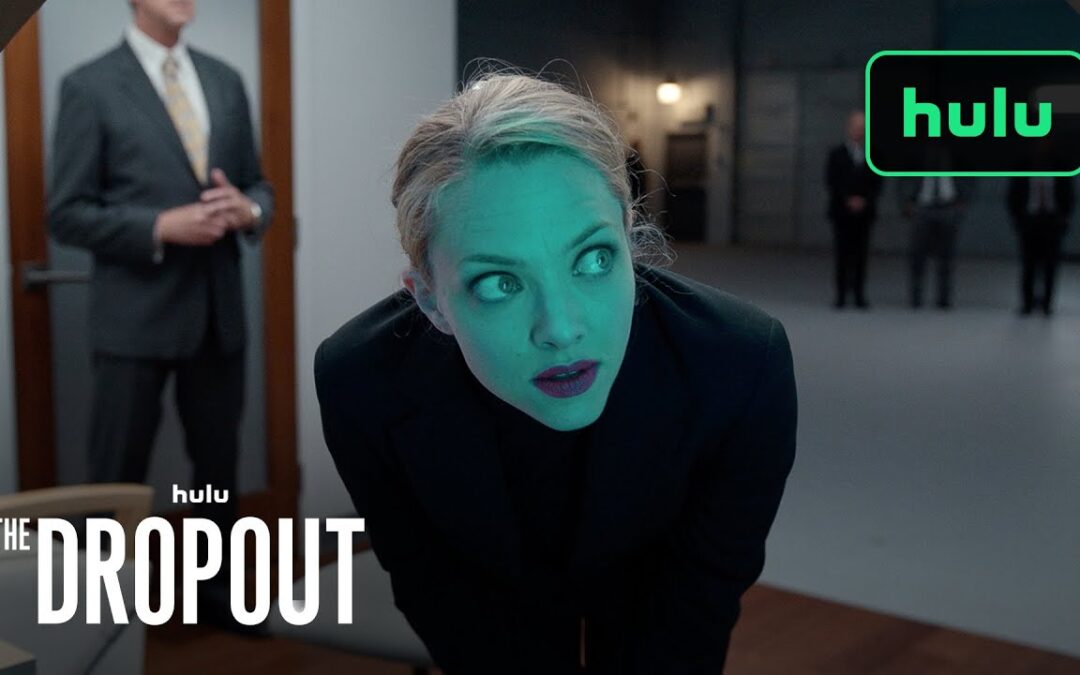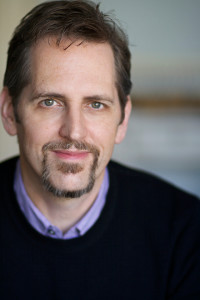It’s rare that I admire the writing of something so much that I make verbal outbursts about it while watching, annoying the people around me.
This is what happened last week as I binged Hulu’s The Dropout.
I won’t spoil major plot details, but if you’re someone who doesn’t want to know ANYTHING about a show before you watch it, you might want to stop reading.
And if you have seen it, you’ll get more of what I’m talking about.
But I’ll try to confine my comments to takeaways about good writing that can be applied to anyone’s work.
So where to start?
Whose story is it?
This is often the key question.
In a feature film, it’s typically one person’s story and we’re in their subjective point-of-view throughout, understanding what they’re wanting, feeling what they’re feeling, caring about what they’re trying to achieve. Ideally.
In a series, it’s more about a web of conflict and an ensemble of characters who get stories that do this, intertwined with each other, so you really have multiple “main characters.”
What The Dropout does that is more rare, and more tricky, is that it starts out as Elizabeth Holmes’ story, played from her perspective. You get invested in her. For several episodes.
Then, suddenly, it starts to play more and more from other people’s points-of-view, giving them the main story goals we follow, at just the point where Elizabeth switches from a likable but intense young woman with a dream, to a sort of monster CEO.
We don’t leave her completely, and she continues to have problems and conflicts she’s trying to deal with in every scene she’s in. But she becomes somewhat more remote to us, more scary, more unsympathetic, as the series wears on. It focuses more on other people’s stories. People we didn’t even meet in the first few episodes. Who are opposing her.
I would definitely say “don’t try this at home,” as it would be really easy for this not to work.
In fact I’ve blogged before about series that started off focusing on one or two compelling character situations that run out of steam (meaning compelling conflict), at which point the series starts to focus more on people who were secondary before. It can be a struggle to get the audience to suddenly care about those people and what’s going on in their lives. Shows that I’ve loved in their first seasons have gone down this road in recent years, such as Crazy Ex-Girlfriend and Glow.
With The Dropout, though, it works. Partly because the true story is so compelling, and Elizabeth becomes such a villain over time, that it’s easy to relate to these other people who are against her (and losing), and to care about what they’re trying to do.
But part of why it works is writing execution. (Along with spectacular casting and acting.)
This show is a master class in making every scene radiate the elements I think are necessary for the most compelling writing. Specifically, in my book I talk about the PROBLEM acronym of Punishing, Relatable, Original, Believable, Life-Altering, Entertaining and Meaningful.
And somehow as they move from character to character and story to story in The Dropout, they keep fulfilling all of those criteria, over and over again, for 8 fascinating episodes.
How?
Where it really starts is making sure each scene has a compelling conflict at its heart, and a relatable point-of-view. Meaning that somebody wants something, and there’s something in the way, and they’re doing something to try to get it.
That might seem very basic, but you’d be surprised how many scripts I read where that’s not what’s going on in many of the scenes. Where it’s more “information exchange.” Where nobody has an agenda they’re pursuing. Or a conflict. Where there’s not a clear main character of the scene driving it forward with a strong intention.
And the audience remains at a distance.
The Dropout never does that. In every scene, we’re given someone who has a strong desire and conflict. We relate to them, their situation is punishing and it has life-altering stakes. And the execution of those scenes somehow balances originality, believability and “being entertaining” at the same time, which is no small feat.
For example, several episodes in, we leave Elizabeth’s point-of-view and introduce a group of Walgreens executives who are considering making a deal with her. Suddenly we’re focused on and relating to several of those people as they encounter problems with that. Sounds kind of boring, right? It isn’t. Not only is it not boring, it’s FUNNY. And it matters hugely to us how this works out.
Later we meet a Wall Street Journal writer and start to fall in love with him, and his editor, and their relationship, and the intriguing, specific, original, funny, believable ways they interact.
This goes on and on.
If you know the true story of how Elizabeth intimidated enemies with super lawyer David Boies, you might expect him to come off as the antichrist in this. Nope. And the scenes with he and Elizabeth alone together are rife with their own conflicts, over the fact that he suspects she’s not telling him everything, and wants her to. Or later when he advises a certain kind of approach to an interview and watches her go off the rails.
As for Elizabeth’s relationship with secret romantic partner and COO Sunny Balwani, it’s one of the most intriguing, original, complicated, dimensional relationships I’ve ever seen portrayed on screen, that left me surprised, agape even, and never less than completely captivated, through its entire fascinating evolution. I know I’m gushing. I can’t help it.
There’s a scene near the end when everything’s starting to fall apart around them and between them that is a master class in dialogue subtext, as they confront each other. You’ll know it when you see it.
I could go on and on. But I’ll leave you with that.
My hat is off to the writers of The Dropout, led by Liz Meriwether, who is best known as the creator and showrunner of New Girl. Yes, New Girl. Even she was surprised when she was picked to possibly take the reins of this limited series. But she, along with one of my favorite directors Michael Showalter (also known more for comedy, including The Big Sick), have overseen and created something truly remarkable.
Please watch it and comment below!



Erik, I agree with you on this series. I watched it several weeks ago, and I am still raving about it. So well-written and Amanda was excellent as the lead.
I have been suggesting it to people, but they still haven’t watched it. It kept me streaming, and I finished it in a few days.
Thanks for the comment and glad you enjoyed it Mrs. Focht! (Sorry it’s hard to break the habit of calling you that…) 🙂
I’ve just started to watch it (first 2 episodes) having read this and yes it’s compelling. I recognised the story after a few minutes having read a little of her and the case and that first episode rattles along. It’s amazing sometimes how little information has to be imparted to compel us to watch but also let it be a puzzle and present us with a 2 + 2 for us to work out. It’s tone is interesting too, it seems to shift from serious drama into a dramedy? I’m hooked and will be watching with interest.
Yes the tone does move around a bit – I’m awed by how Liz Meriwether and the other writers, directors and cast find the comedy here and there within an otherwise dramatic story. And that’s something I talk about a lot with writers working on multi-genre or genre mash-up projects: find the home genre and make sure it functions solidly as that (whether that’s drama, action, horror, etc.), and if you’re going to sprinkle in something lighter along the way (something lower-stakes, like comedy), make sure you’re doing it in the context of a story that still strongly works in its home genre as an ongoing foundation.
Watched the trailer. Looks highly pertinent to a lot we’ve seen in recent years and I wish I could see it! But we don’t have Hulu in France.
That said, the structure you’ve described sounds very similar to “Stranger Things”, the films “The Last Duel”, “The Laudromat” and other things I’ve seen (and enjoyed) in recent years. Wasn’t “I, Tonya” also a bit along those lines?
If you’ve seen, I’d be curious to hear more on how “The Dropout” differs. From the description above, it sounds like recognition of a popular new paradigm – which I suspect can be found in a few old classic films but then got lost awhile thanks to “rules” that got established via “Save the Cat” and others gurus.
The point I would make about Stranger Things and other series is that there’s a difference between continuously intertwining stories from several different characters throughout an episode, season or series (as most series do, and some movies do), and suddenly switching point-of-view completely after several episodes like The Dropout did. I don’t think this is an issue of something that once commonly worked coming back, or rules/formulas squelching something that once worked and was used a lot.
Kind of like Dracula ??
How so?
Just great! Now I can’t read your post now because you’ve given me homework to watch! 🤣 But at least you weren’t gushing about the new A League of Their Own on Prime. 😬
Haven’t seen it yet but it sounds like you’re not a fan! 🙂